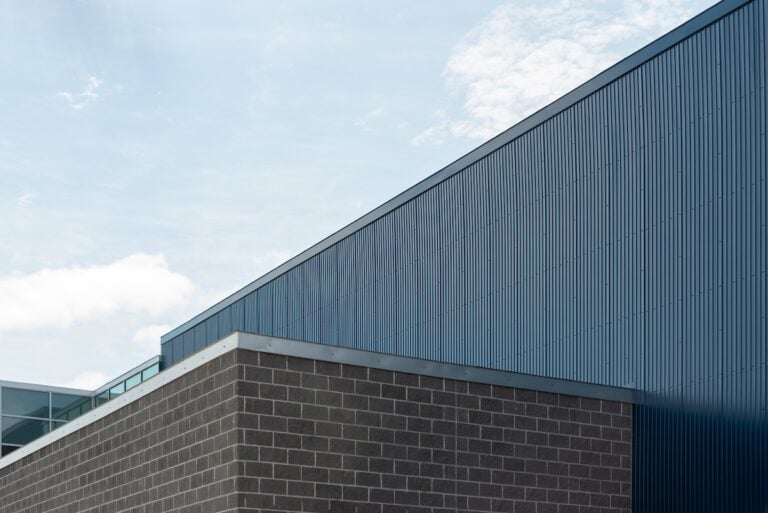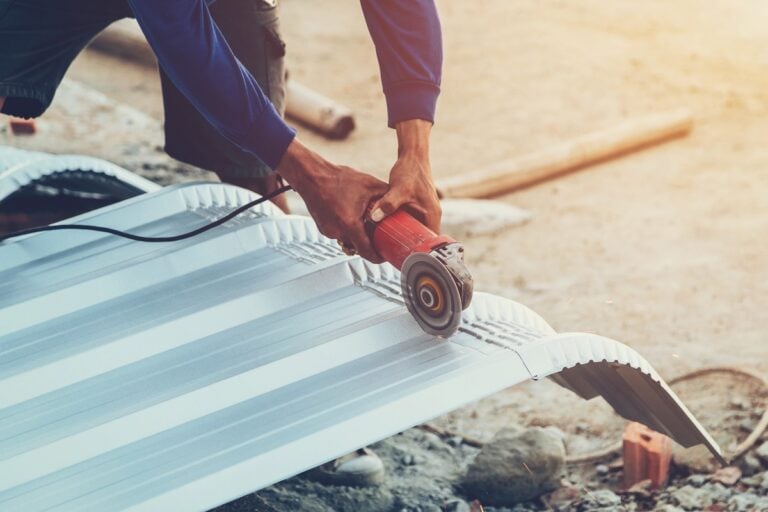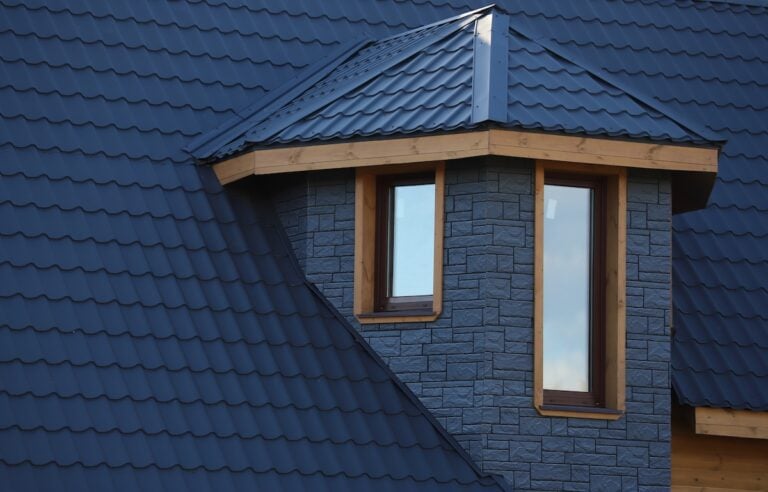In the past years, the popularity of metal roofing has been steadily increasing in the country. This roofing material boasts low maintenance and a long lifespan, so it’s no wonder why more homeowners are choosing metal for their home roofing needs.
If you’re one of the homeowners planning to invest in installing metal roofs for your Portland home– it would be best to have a solid grasp of all the advantages and disadvantages this entails.
Why More Portland Homeowners Are Choosing Metal Roofing
So, why are more Portland homeowners considering a metal roofing installation? Portland weather is no joke. Between the heavy rains, surprise hail, and occasional snow, your roof works overtime.
Metal roofing appeals to many because it’s lightweight, fire-resistant, and highly reflective—especially valuable in the summer when you’re trying to keep cooling costs in check.
Besides performance, metal roofing adds a clean, modern look that pairs surprisingly well with everything from craftsman bungalows to mid-century ranch homes.


Another significant draw? Portland’s local green building initiatives and incentives. Metal roofs often meet or exceed Energy Trust of Oregon standards for cool roofing, potentially qualifying homeowners for rebates and improved home energy scores.
Metal Roof Pros & Cons Comparison Table
| Pros | Cons |
|---|---|
| 🌧️ Highly durable in wet, windy climates – resists moss, rot, and leaks. | 💰 Higher upfront cost – $9–$16 per sq ft installed. |
| ♻️ Eco-friendly – recyclable materials, energy-efficient coatings. | 🔊 Can be noisy during rain – insulation helps reduce sound. |
| 🧊 Fire-resistant – Class A rating; safer in wildfire-prone areas. | ⚠️ Slippery when wet – walking on it or falling snow can be dangerous. |
| 🔧 Low maintenance – minimal moss and debris buildup. | 🛠️ Can dent – tree limbs, hail, or debris may leave permanent marks. |
| 🏠 Lightweight – ideal for older Portland homes; easier to install. | 🧰 Complex install for some roof shapes – may require custom flashing or snow guards. |
8 Benefits of Installing Metal Roofing in Portland
The material is also virtually maintenance-free. If you consider tending to a roof’s regular upkeep a tiring chore, this roofing option is for you. Here’s some of the main pros of choosing to install a metal roof in Portland:
1. Exceptional Durability in Rainy Climates
Portland experiences around 155 rainy days annually, which makes weather resistance a top priority for homeowners. Metal roofs outperform traditional asphalt shingles in resisting water infiltration, rot, and mold growth.
2. Energy Efficiency That Lowers Utility Bills
Metal roofing reflects solar radiant heat, which can reduce cooling costs by 10% to 25%, even in Portland’s temperate summers. Modern coatings enhance this reflectivity, which makes it especially beneficial during warmer months and in homes with southern exposures.
Pro Tip: Opt for cool-metal roofing certified by ENERGY STAR® to maximize year-round energy efficiency.
3. Longevity Backed by Industry Warranties
Metal roofs are famous for their longevity. A quality metal roof can last 40–70 years, compared to 15–30 years for asphalt shingles. Many manufacturers, such as CertainTeed or Drexel Metals, offer warranties up to 50 years. This makes it a one-time investment for most homeowners.
Homeowners who have their metal roofs inspected at least twice a year and follow proper maintenance help prolong their lifespan more than the average. You can count on your metal roof to thrive in snow, rainwater, and windstorms. Additionally, it is resistant to fire, mildew, and insect infestation.
4. Eco-Friendliness and Sustainability
Metal roofs are often made from 25% to 95% recycled materials and are fully recyclable at end-of-life. Portland homeowners with a focus on sustainable living appreciate this eco-conscious feature. Additionally, the lightweight nature of metal puts less structural strain on older Portland homes.
5. Fire Resistance in Wildfire-Prone Regions
While Portland isn’t known for wildfires directly, surrounding areas increasingly face wildfire risks. Metal roofs provide a Class A fire rating—the highest available—making them a smart choice for rural or forest-adjacent homes.
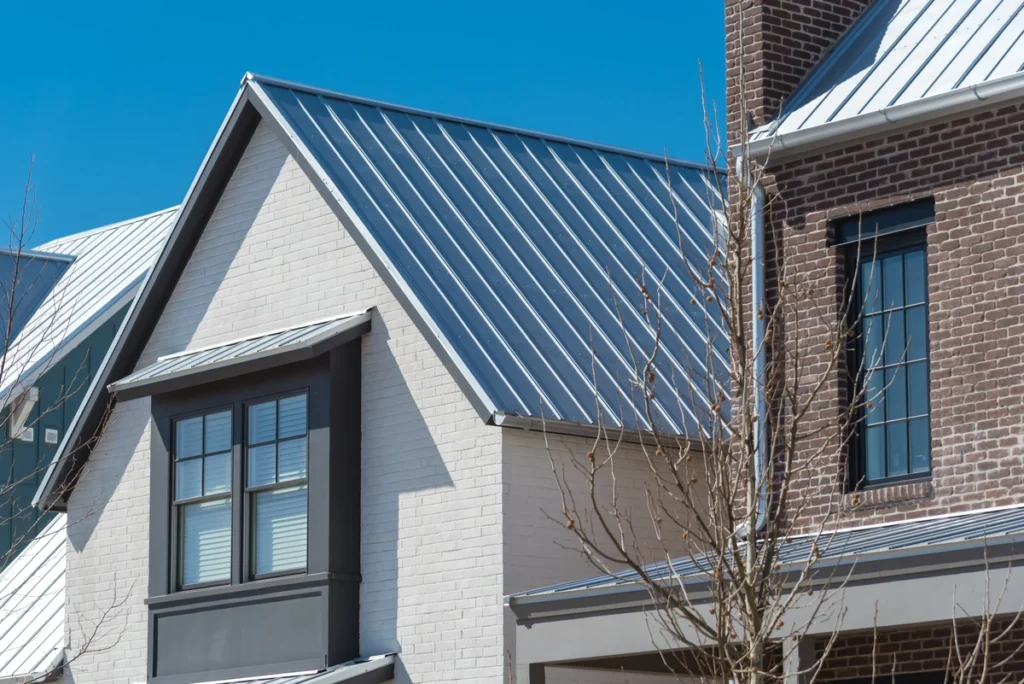
6. Exceptionally Sturdy in Pacific Northwest Storms
Portland can experience powerful wind gusts during winter storms, especially in exposed areas near the Columbia River Gorge. Metal roofs are engineered to withstand winds of up to 140 mph—well above typical storm conditions in the region.
What sets metal roofing apart is its interlocking panel design, which creates a tight seal against wind uplift. Unlike asphalt shingles, which can crack or blow off, properly installed metal panels remain firmly in place.
7. Minimal Debris Build-Up Means Fewer Repairs
Because of its smooth, non-porous surface, metal roofing sheds water, snow, and debris more efficiently than most roofing materials. Portland’s frequent rain and wet leaf fall are common causes of roof damage—especially in shaded neighborhoods prone to moss and gutter clogging.
With metal, there’s less buildup of organic debris, reducing the risk of:
- Water pooling
- Ice dams (in cold snaps)
- Algae and moss growth
This means fewer maintenance headaches and a reduced need for annual roof cleanings.
8. Lightweight Yet Strong—Ideal for Older Portland Homes
Weighing between 100 to 150 pounds per square, metal roofing is significantly lighter than concrete tile (which can weigh 750 to 1,000 pounds per square). This is a crucial benefit for many of Portland’s historic homes and craftsman bungalows, which may have structural limitations.
The lightweight profile also makes metal roofing:
- Easier and faster to install
- A good candidate for overlay installs (installing over existing shingles)
- Less likely to require costly structural reinforcement
Installation Tip: Ask your contractor to inspect your current roof decking and attic structure. Many Portland homes can safely accommodate a metal roof overlay, reducing landfill waste and labor costs.
Cons of Metal Roofing in Portland
💸 Higher Upfront Cost
Metal roofing is a premium product, and that’s reflected in its price. In Portland, the average cost ranges from $9 to $16 per square foot installed, depending on the type of metal (steel, aluminum, zinc) and the roofing profile (standing seam vs. corrugated).
Though this price point is higher than asphalt shingles, it’s important to weigh the long-term ROI:
- Lower lifetime maintenance
- Increased resale value
- Greater longevity (40–70 years)
🔊 Can Be Noisy in Heavy Rain
Portland averages 36 inches of rainfall per year. On a metal roof, especially one installed without adequate insulation, that rain can sound more pronounced—some describe it as a loud tapping or drumming.
However, this issue is largely preventable:
- Use solid plywood decking
- Add high-density insulation or acoustic barriers
- Opt for textured or stone-coated metal, which dampens sound
Tip: Ask your contractor about sound-deadening underlayments—these can dramatically reduce interior noise levels.
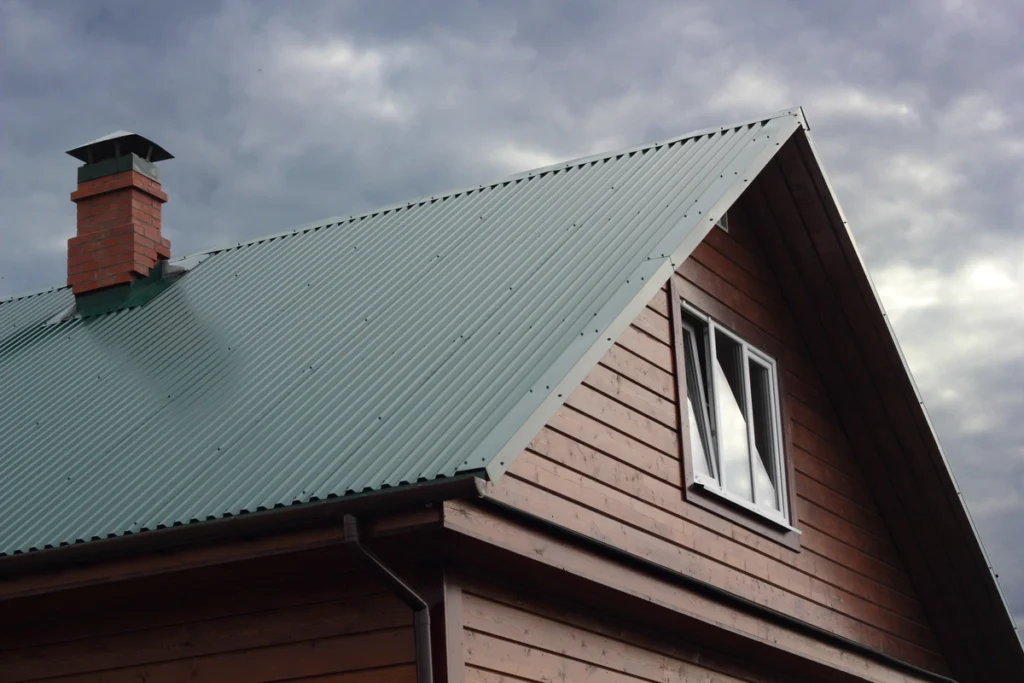
⚠️ Slippery Surface = Safety Hazard
Metal roofs shed snow and rain efficiently—but this can create new hazards:
- Walking on a wet or mossy metal roof is extremely slippery
- Falling snow or ice can damage gutters or harm people below
- Debris from not previously cleaning the roof
If you live in hilly or elevated parts of Portland where snow accumulation is more likely, consider adding:
- Snow guards or retention rails
- Heated cables in valleys to prevent ice buildup
🛠️ Vulnerable to Dents in Certain Conditions
While metal is strong, it can be dented by heavy impact. This is especially true for softer metals like aluminum or copper.
Potential dent sources in the Portland area include:
- Falling tree limbs from Douglas firs or western red cedars
- Hailstorms, though rare, have become more frequent in recent years
- Large pinecones or blown debris during windstorms
Recommendation: Choose steel over aluminum if dent resistance is a concern, or ask for impact-rated panels certified under UL 2218 Class 4 standards.
📍 Portland-Specific Considerations for Metal Roofs
Metal roofing is an excellent choice for many Portland homeowners—but it’s important to understand how the city’s unique climate, environment, and regulations can impact your experience. Here are key local factors to consider before making the switch:
🏡 1. Historic District Restrictions
Portland is home to several designated historic districts, including Irvington, Ladd’s Addition, and parts of Northwest. These neighborhoods may have specific design guidelines or restrictions on visible exterior changes, including roofing materials.
Tip: Check with the Portland Historic Landmarks Commission or your neighborhood association before proceeding. In some cases, metal roofing can still be approved if it mimics traditional materials (e.g., metal shingles resembling wood).
🌲 2. Tree Coverage and Moss Potential
Many Portland neighborhoods are densely shaded by evergreens and maples—great for aesthetics, but a challenge for roofs. While metal is naturally resistant to moss and algae, shaded or low-slope areas can still experience organic buildup over time.
Solutions:
- Opt for steeper roof pitches if building new.
- Schedule periodic professional cleanings, especially in fall and spring.
- Install zinc strips along ridgelines to discourage moss growth.
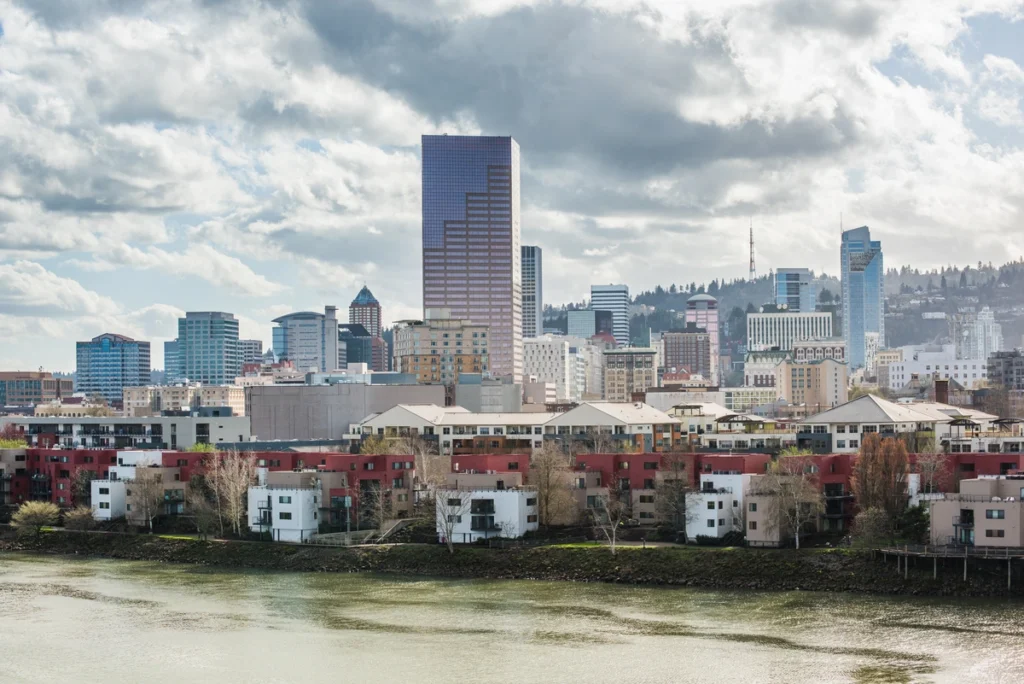
🌧️ 3. Rainfall Management
Portland averages over 36 inches of rain per year. Metal sheds water efficiently, but that runoff needs to be managed properly to avoid drainage issues.
Considerations:
- Install oversized or seamless gutters to handle increased water flow.
- Add gutter guards to reduce clogging from leaves and pine needles.
- Ensure downspouts direct water away from the foundation—especially in hilly east-side neighborhoods.
❄️ 4. Snow Slide Risks in Elevated Areas
While lower elevations see little snow, areas like Forest Park, West Hills, and Mount Tabor can accumulate snow and ice in winter. Metal roofs can cause snow to slide off in sheets, which can damage gutters, landscaping, or pose a safety hazard.
Solution: Add snow guards or retention bars to break up falling snow and ice in high-risk zones.
💸 5. Local Rebates & Green Incentives
Because metal roofs are energy-efficient and recyclable, they may qualify for rebates or credits through:
- Energy Trust of Oregon
- Local green building programs
- Federal energy efficiency tax credits
Pro Tip: Ask your roofer to document materials and installation methods to support any rebate or incentive applications.
Ready to Find Out if Metal Roofing Is Right for You?
Choosing a new roof is a major decision—and in Portland’s rainy, tree-lined environment, it pays to invest in a material that offers lasting protection. Metal roofing stands out for its durability, efficiency, and low maintenance—especially when paired with the right local expertise.
That said, it’s not a one-size-fits-all solution. Factors like upfront cost, local climate nuances, and your home’s specific structure should all be part of the equation. The good news? You don’t have to navigate that decision alone.
If you’re considering a metal roof and want advice tailored to your property, reach out to our team at Boss Exteriors. We’re happy to review your roofing goals, answer your questions, and provide transparent recommendations based on years of experience with Portland homes.
FAQs
Do metal roofs rust in Portland’s rainy climate?
No—most modern metal roofs are coated with corrosion-resistant finishes like Galvalume® or zinc-aluminum alloys, which prevent rust. With proper installation and maintenance, rust is not a concern—even in Portland’s damp environment.
Is a metal roof worth the cost in Portland?
For many homeowners, yes. Although the upfront cost is higher, the long lifespan, reduced maintenance, energy savings, and improved weather resistance offer long-term value—especially if you plan to stay in your home for 10+ years.
Is metal roofing noisy during Portland rainstorms?
It can be—but with proper installation, noise is easily minimized. Insulated attic spaces, solid decking, and sound-deadening underlayments greatly reduce rain noise, often making it comparable to asphalt roofing.


